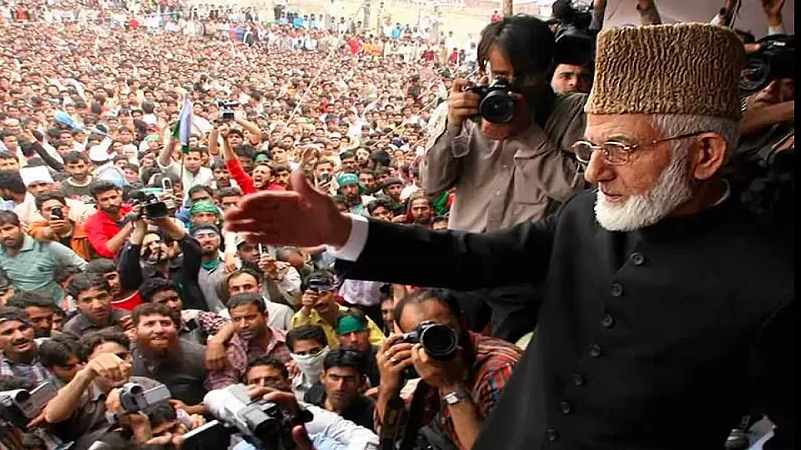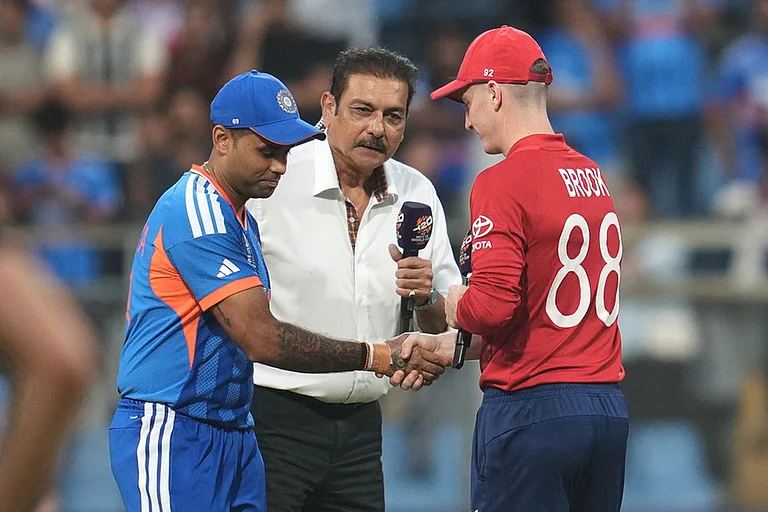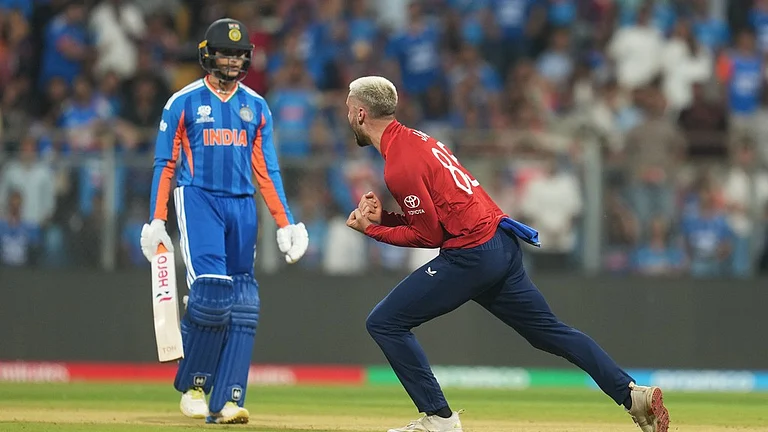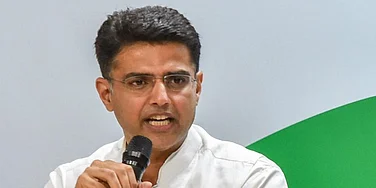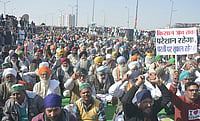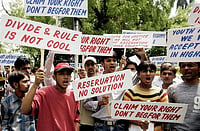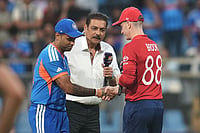In yet another sign of change of times, another separatist party, Tehreek-e-Hurriyat (TEH), has now been relegated to the footnotes of Kashmiri polity. Just two decades back, the TEH and its founder Syed Ali Shah Geelani were among the main stakeholders in Kashmir.
The Centre on Sunday declared TEH as an unlawful organisation under the Unlawful Activities (Prevention) Act (UAPA) for a period of five years. In a notification, the Ministry of Home Affairs (MHA) said TEH supports terrorist activities in league with Pakistan and works for the secession of Kashmir from India and the establishment of Islamic rule in the region.
The late Kashmiri separatist leader Geelani founded the pro-Pakistan party TEH after splitting from the All Parties Hurriyat Conference (APHC) over his opposition to talks with New Delhi. It became part of the broader Hurriyat umbrella led by Geelani, referred to at times as 'Hurriyat (G)'. Geelani served as the leader of TEH until 2018 and headed the broader Hurriyat faction until 2020.
For decades, Geelani was the foremost separatist leader of Kashmir, who held immense clout. Instead of merely calling for the separation of Kashmir from India, Geelani called for the accession of Kashmir to Pakistan. He had been under house arrest since 2010.
Here we explain why the Centre banned TEH, how the organisation was formed, and how Geelani led the Kashmiri separatist movement over the years.
Why Did Centre Ban Tehreek-E-Hurriyat?
The Centre banned the Tehreek-e-Hurriyat (TEH) on Sunday over support for terrorism and secessionist activities. It is the latest Kashmiri separatist organisation to be banned.
In a notification, the Ministry of Home Affairs (MHA) said that the leaders and members of THA are involved in raising funds through various sources, including Pakistan and its proxy organisations, for perpetrating unlawful activities. The MHA further said that the TEH members and leaders are involved in anti-India propaganda, supporting stone-pelting, and paying tributes to terrorists killed in encounters.
"The Central Government is of the opinion that if there is no immediate curb or control of unlawful activities of the Tehreek-e-Hurriyat, Jammu and Kashmir, it will use this opportunity to: (i) continue advocating the secession of Jammu and Kashmir form the Union of India while disputing its accession to the Union of India; and (ii) continue with the anti-national activities which are detrimental to the territorial integrity, security and sovereignty of the country; and (iii) continue propagating false narrative and anti-national sentiments among the people of Jammu and Kashmir with the intention to cause disaffection against India and disrupt public order," said the MHA in its notification.
Citing the above reasons, the Centre banned TEH for five years. The ban would need to be renewed, if the government at the time wishes to renew it, after the end of the five years starting Sunday, December 31, 2023.
History Of Tehreek-E-Hurriyat
The Tehreek-e-Hurriyat (TEH) stemmed from a split in the All Party Hurriyat Conference (APHC) in 2004. It is part of the broader separatist political movement in Kashmir that began with the founding of APHC in 1993.
In 2003, hardline pro-Pakistan and anti-talks elements led by Syed Ali Shah Geelani separated from the APHC over their opposition to the openness of the 'moderates' led by Mirwaiz Umer Farooq for talks with New Delhi. Geelani and his trusted lieutenant Ashraf Sehrai also left the Jamaat-e-Islami (JEI) Jammu and Kashmir, another separatist organisation that was part of the undivided APHC during 1993-2003.
In 2004, Geelani and Sehrai floated the party TEH. The TEH later became part of the broader faction of the original APHC led by Geelani, which came to be referred to as 'Hurriyat (G)'. Geelani quit as the chief of TEH in 2018 and as the chief of the broader faction in 2020.
Several TEH and Hurriyat members are currently in jail on terrorism-related charges. They include the infamous terrorist Bitta Karate.
The PTI lists the following Hurriyat (G) members and leaders who have been charged by the National Investigation Agency (NIA).
- Farooq Ahmad Dar alias Bitta Karate
- Altaf Ahmad Shah alias Fantoosh
- Mohammad Akbar Khanday
- Raja Mehrajuddin Kalwal
- Bashir Ahmad Bhat alias Peer Saifullah
The TEH is also the latest separatist organisation in Kashmir to be banned. While Geelani headed during 2004-18, Masarat Alam Bhat succeeded Bhat. He is in jail. Bhat is known for his anti-India and pro-Pakistan stance like his predecessor Geelani. Other separatist organisations that have been banned in recent years are:
- Muslim League Jammu Kashmir
- Democratic Freedom Party
- Jamaat-i-Islami Jammu and Kashmir
- Jammu Kashmir Liberation Front
Understanding Syed Ali Shah Geelani's Kashmiri Separatism
Syed Ali Shah Geelani was once the tallest leader of the Kashmiri separatist political movement. The movement has been understood to be the political wing of the armed movement waged by Pakistan-supported terrorist groups.
Outlook's Naseer Ganai earlier noted that Geelani has been dubbed as the "political vanguard of militant separatism".
"Geelani was known for giving prolonged strike calls and one word from was bringing Kashmir to a pause. At times, militants have even wished that, if their path brings them death, it must be Geelani who offers their funeral prayers. And he has obliged, giving funeral speeches on video in his chaste Urdu. That’s why many mainstream leaders painted him as the political vanguard of militant separatism," noted Ganai.
The All Parties Hurriyat Conference (APHC) was founded in 1993. The formation as well as later functioning of the group was supported by Pakistan.
Before joining APHC at the time of its founding, Geelani was active in separatist politics with Jamaat-e-Islami (JeI) Jammu and Kashmir. He had also contested elections. He was an MLA during 1972-83 and also contested the 1975 parliamentary elections unsuccessfully. He contested the 1987 assembly elections with the backing of the Muslim United Front (MUF) opposed to mainstream political parties of the day and won. The 1987 elections results are widely contested and polls have been popularly believed to be rigged in favour of the Congress-National Conference (NC) coalition. He resigned in 1989 over the rigging allegations.
The APHC as well as Geelani have been understood to be part of the Pakistani machinations to foment separatism in Kashmir. While broadly backed by Pakistan, it also had pro-independence members and such diversity of positions made APHC an umbrella organisation instead of a group with uniformity.
"It had brought together two separate, but strong ideologies: those who sought J&K’s independence from both India and Pakistan, and those who wanted J&K to become part of Pakistan. Most of the groups that were part of the Hurriyat had their militant wings, or were linked to a militant outfit...After the armed resistance began in 1989, Geelani resigned from the Assembly and took a lead role in separatist politics. When the Hurriyat was formed, he became its member, and later its chairman," noted Muzamil Zaleel in The Indian Express.
Geelani through his separatist movement was supportive of the Pakistan-backed terrorist movement in Kashmir. In his book 'India, Pakistan And The Secret Jihad', Praveen Swami noted that Geelani's support for terrorism began in 1990 after he left electoral politics.
"With its formidable network of cadre across Jammu and Kashmir, however, the Jamaat-e-Islami soon became the patron of the largest jihadist group, the Hizb-ul-Mujahideen. A plethora of other groups emerged, most of them, like the Hizb-ul-Mujahideen, with expressly Islamist sympathies and committed not to the independence of Jammu and Kashmir, but its accession to Pakistan," wrote Swami.
About the ideology of Geelani's movement, Swami noted that while JEI did not use the anti-Hindu rhetoric that the Lashar-e-Taiba (LET) used, there was not much difference between the inherent ideology of the movements. He also argued that the Hindus and Muslims are "irrevocably apart" and thus cannot live in the same country and therefore Kashmir needed to be separated from India and merged into Pakistan.
"Geelani’s ideas on the very basis for Kashmiri accession to Pakistan are deeply similar to those of groups like the Lashkar-e-Taiba. In matters of faith, belief and customs, Geelani argues, Hindus and Muslims are set irrevocably apart, as they are divided by such matters as food, clothing and lifestyles. He describes it as being as difficult for Muslims to live in a Hindu milieu as 'for a fish to stay alive in a desert'. Muslims, he argues, cannot live harmoniously with a Hindu majority without their own religion and traditions coming under a grave threat, one major factor being what he perceives to be Hinduism's capacity to assimilate other religions. For Islam to be preserved and promoted in Jammu and Kashmir, in Geelani's conception, it is necessary for it to be separated from India," noted Swami.


